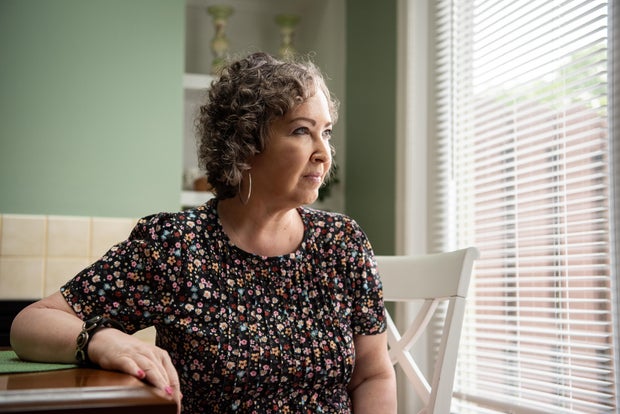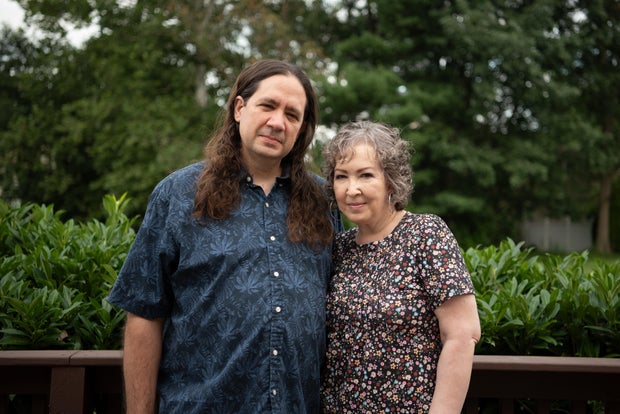CBS News
Why Americans are traveling to Vermont and Oregon to die

In the 18 months after Francine Milano was diagnosed with a recurrence of the ovarian cancer she thought she’d beaten 20 years ago, she traveled twice from her home in Pennsylvania to Vermont. She went not to ski, hike or leaf-peep, but to arrange to die.
“I really wanted to take control over how I left this world,” said the 61-year-old who lives in Lancaster. “I decided that this was an option for me.”
Dying with medical assistance wasn’t an option when Milano learned in early 2023 that her disease was incurable. At that point, she would have had to travel to Switzerland — or live in the District of Columbia or one of the 10 states where medical aid in dying was legal.
But Vermont lifted its residency requirement in May 2023, followed by Oregon two months later. (Montana effectively allows aid in dying through a 2009 court decision, but that ruling doesn’t spell out rules around residency. And though New York and California recently considered legislation that would allow out-of-staters to secure aid in dying, neither provision passed.)
Despite the limited options and the challenges — such as finding doctors in a new state, figuring out where to die and traveling when too sick to walk to the next room, let alone climb into a car — dozens have made the trek to the two states that have opened their doors to terminally ill nonresidents seeking aid in dying.
At least 26 people have traveled to Vermont to die, representing nearly 25% of the reported assisted deaths in the state from May 2023 through this June, according to the Vermont Department of Health. In Oregon, 23 out-of-state residents died using medical assistance in 2023, just over 6% of the state total, according to the Oregon Health Authority.
Eric Harkleroad/KFF Health News
Oncologist Charles Blanke, whose clinic in Portland is devoted to end-of-life care, said he thinks that Oregon’s total is likely an undercount and he expects the numbers to grow. Over the past year, he said, he’s seen two to four out-of-state patients a week — about one-quarter of his practice — and fielded calls from across the U.S., including New York, the Carolinas, Florida and “tons from Texas.” But just because patients are willing to travel doesn’t mean it’s easy or that they get their desired outcome.
“The law is pretty strict about what has to be done,” Blanke said.
As in other states that allow what some call physician-assisted death or assisted suicide, Oregon and Vermont require patients to be assessed by two doctors. Patients must have less than six months to live, be mentally and cognitively sound, and be physically able to ingest the drugs to end their lives. Charts and records must be reviewed in the state; neglecting to do so constitutes practicing medicine out of state, which violates medical licensing requirements. For the same reason, the patients must be in the state for the initial exam, when they request the drugs, and when they ingest them.
State legislatures impose those restrictions as safeguards — to balance the rights of patients seeking aid in dying with a legislative imperative not to pass laws that are harmful to anyone, said Peg Sandeen, CEO of the group Death With Dignity. Like many aid-in-dying advocates, however, she said such rules create undue burdens for people who are already suffering.
Diana Barnard, a Vermont palliative care physician, said some patients cannot even come for their appointments. “They end up being sick or not feeling like traveling, so there’s rescheduling involved,” she said. “It’s asking people to use a significant part of their energy to come here when they really deserve to have the option closer to home.”
Those opposed to aid in dying include religious groups that say taking a life is immoral, and medical practitioners who argue their job is to make people more comfortable at the end of life, not to end the life itself.
Anthropologist Anita Hannig, who interviewed dozens of terminally ill patients while researching her 2022 book, “The Day I Die: The Untold Story of Assisted Dying in America,” said she doesn’t expect federal legislation to settle the issue anytime soon. As the Supreme Court did with abortion in 2022, it ruled assisted dying to be a states’ rights issue in 1997.
During the 2023-24 legislative sessions, 19 states (including Milano’s home state of Pennsylvania) considered aid-in-dying legislation, according to the advocacy group Compassion & Choices. Delaware was the sole state to pass it, but the governor has yet to act on it.
Sandeen said that many states initially pass restrictive laws — requiring 21-day wait times and psychiatric evaluations, for instance — only to eventually repeal provisions that prove unduly onerous. That makes her optimistic that more states will eventually follow Vermont and Oregon, she said.
Milano would have preferred to travel to neighboring New Jersey, where aid in dying has been legal since 2019, but its residency requirement made that a nonstarter. And though Oregon has more providers than the largely rural state of Vermont, Milano opted for the nine-hour car ride to Burlington because it was less physically and financially draining than a cross-country trip.
The logistics were key because Milano knew she’d have to return. When she traveled to Vermont in May 2023 with her husband and her brother, she wasn’t near death. She figured that the next time she was in Vermont, it would be to request the medication. Then she’d have to wait 15 days to receive it.
The waiting period is standard to ensure that a person has what Barnard calls “thoughtful time to contemplate the decision,” although she said most have done that long before. Some states have shortened the period or, like Oregon, have a waiver option.
That waiting period can be hard on patients, on top of being away from their health care team, home, and family. Blanke said he has seen as many as 25 relatives attend the death of an Oregon resident, but out-of-staters usually bring only one person. And while finding a place to die can be a problem for Oregonians who are in care homes or hospitals that prohibit aid in dying, it’s especially challenging for nonresidents.
When Oregon lifted its residency requirement, Blanke advertised on Craigslist and used the results to compile a list of short-term accommodations, including Airbnbs, willing to allow patients to die there. Nonprofits in states with aid-in-dying laws also maintain such lists, Sandeen said.
Milano hasn’t gotten to the point where she needs to find a place to take the meds and end her life. In fact, because she had a relatively healthy year after her first trip to Vermont, she let her six-month approval period lapse.
In June, though, she headed back to open another six-month window. This time, she went with a girlfriend who has a camper van. They drove six hours to cross the state border, stopping at a playground and gift shop before sitting in a parking lot where Milano had a Zoom appointment with her doctors rather than driving three more hours to Burlington to meet in person.
Eric Harkleroad/KFF Health News
“I don’t know if they do GPS tracking or IP address kind of stuff, but I would have been afraid not to be honest,” she said.
That’s not all that scares her. She worries she’ll be too sick to return to Vermont when she is ready to die. And, even if she can get there, she wonders whether she’ll have the courage to take the medication. About one-third of people approved for assisted death don’t follow through, Blanke said. For them, it’s often enough to know they have the meds — the control — to end their lives when they want.
Milano said she is grateful she has that power now while she’s still healthy enough to travel and enjoy life. “I just wish more people had the option,” she said.
KFF Health News is a national newsroom that produces in-depth journalism about health issues and is one of the core operating programs at KFF — the independent source for health policy research, polling and journalism.
CBS News
Which CD account should you open now that the Fed’s cut rates again?

Getty Images
Expectations that the Federal Reserve would cut its benchmark interest rate yet again became a reality on Wednesday when the Fed did just that, issuing a 25 basis point reduction. That brings the federal funds rate to a range between 4.25% and 4.50%. The move was the third such reduction made by the Fed this year and has brought the rate down a combined full percentage point from where it was in early September. But it came after two recent inflation readings showed that rate increasing, so the forecast for additional rate reductions in 2025 is now unclear.
Against this backdrop, savers who were able to capitalize on an elevated rate climate via certificate of deposit (CD) accounts may be pondering their next move. Whether they have a current account approaching maturity or are considering a new one, it helps to know which type to open in today’s evolving rate climate. Below, we’ll break down what to consider (and what to avoid) now that the Fed’s cut rates yet again.
See how much more you could be earning on your money with a top long-term CD here.
Which CD account should you open now that the Fed’s cut rates again?
The decision surrounding which CD account to open right now is a personal one, depending on your financial circumstances and your ability to keep your money untouched for the full CD term (or length). That noted, on the surface, it may be tempting to open a short-term CD now. A 3-month CD or a 6-month CD, for example, has a rate of 4.50% now. 2-year CDs, meanwhile, have rates of 4.25% while 3-year and 5-year CDs have the same. So if your goal is to earn the highest rate, a short-term CD account can accomplish that goal. But if you’re looking to earn as much interest as possible – which most savers are – a long-term account is the better option.
Let’s use $10,000 as an example. That amount deposited in a 6-month CD now will result in $222.52 earned upon maturity. But that same amount in a 2-year CD would leave you with $868.06 earned and $2,313.47 in a 5-year account. And that wide discrepancy in returns isn’t the only reason to open a long-term CD now.
With three Fed rate cuts already issued in 2024 and others likely for 2025, returns on all CD accounts, no matter the term, will continue to decline. But that won’t be a concern with a long-term CD since interest rates on CDs are fixed – the rate you open the account with will remain the same one your account matures with. Not only will this allow for predictable returns but it will allow your money to grow undisturbed, regardless of any Fed rate activity during that period. And considering that CD rates were barely above 1% in 2020 or 2021, locking in today’s still attractive rates for the long term can be beneficial for a wide swath of savers.
Get started with a long-term CD online now.
What about high-yield savings accounts?
In recent years, high-yield savings accounts, which had rates comparable to the top CDs, were considered a good alternative. These accounts operate like traditional savings accounts do but at much higher interest rates. And while they’re still relatively high, the rates on these accounts are variable and liable to change as the interest rate climate evolves. That means additional reductions in line with the Fed’s actions, even if they don’t fall by the same proportion. So, if you want to maintain access to your funds, which CDs won’t allow, then a high-yield savings account could still be worth exploring. But if you’re able to leave your money in a CD for the long term, that’s arguably the better way to both protect and grow your savings.
The bottom line
Action taken by the Fed will require both borrowers and savers to be nimble in their approach. For many, this could mean moving a portion of their funds into a long-term CD account to both exploit today’s high rates – and maintain them in the face of additional rate cuts to come. Others, however, may be better served by using a high-yield savings account instead. No matter your situation, however, it’s important to have at least some money in a high-earning account now. With rate changes inevitable, it makes sense to earn as much interest as possible while you still can.
Have more CD questions? Learn more here now.
CBS News
What are seed oils and do they pose health risks? Here’s what to know

Seed oils are making headlines, prompting fears around whether they can negatively affect your health.
Earlier this week, a study published in the journal Gut led to headlines likening seed oils to colon cancer fuel — but already some experts have said the headlines are misleading.
For a fuller picture of seed oils, here’s what to know.
What are seed oils?
Unlike other vegetable oils, which are derived from the fruit of a plant, seed oils are derived from the seed of a plant. For example, sunflower oil is made from sunflower seeds, making it a seed oil, whereas olive oil is made from whole olives, the fruit of the plant.
Some seed oils like sesame, for example, can also be fragrant and add flavor to a dish or dressing, making them popular in some kitchens.
What health risks do they pose?
“Based on the evidence we have, seed oils don’t pose any health risks,” Kristina Petersen, associate professor of nutritional sciences at Penn State University, told CBS News. “In fact, when you look at the evidence, it shows that intake of seed oils, instead of fats like butter and other animal fats, actually improves blood cholesterol levels and lowers risk of diseases like heart disease (and) Type 2 diabetes.”
Dr. Steven Shamah, director of endoscopy at Lenox Hill Hospital, told CBS News, “everything in moderation.”
Like all oils, seed oils contain fat, which is important for a balanced diet but in certain quantities. But the type of fat, saturated or unsaturated, is also important.
Saturated fats — found in meat, dairy and coconut — can raise both “good” and “bad” cholesterol levels, making limited intake recommended. The American Heart Association recommends that no more than 5% to 6% of your daily calories come from saturated fats.
Seed oils are rich in unsaturated fats, which can include both monounsaturated and polyunsaturated fats. Research suggests these fats may decrease “bad” and raise “good” cholesterol.
These oils are also high in the omega-6 fatty acid linoleic acid, which, while essential for bodily functions, should be balanced with omega-3 fatty acids, Shamah said.
“Linoleic acid, commonly found in seed oils in small amounts, is beneficial; however, in large amounts, puts significant stress on many forms of beneficial bacteria in the microbiome,” Shamah said, adding overconsumption can be common in modern diets because seed oils are in many processed foods.
Why do some people consider seed oils bad for your health?
Seed oil critics say linoleic acid, a omega-6 fatty acid found in these oils, breaks down into toxins when used for cooking, causing numerous health issues including inflammation, a weakened immune system and contributing to chronic illnesses.
While linoleic acid can be converted into arachidonic acid in the body, experts say this is not cause for concern.
Petersen said these claims of “toxic by-products” are common on social media, but clinical trial data shows markers of inflammation don’t change when people eat the omega-6 fatty acid linoleic acid. Plus, only a small percentage (about 0.2%) of omega-6s is converted to arachidonic acid, according to Massachusetts General Hospital.
Dr. Christopher Gardner, a professor of medicine at Stanford University School of Medicine in California and a nutrition scientist at the Stanford Prevention Research Center, also told the American Heart Association earlier this year that this argument around omega-6 fatty acids is flawed. While omega-6 can be pro-inflammatory, the amount of inflammation it’s associated with has not been shown to be harmful.
“Omega-6 is a polyunsaturated fat the body needs but cannot produce itself, so it must get it from foods,” Gardner said. “Polyunsaturated fats help the body reduce bad cholesterol, lowering the risk for heart disease and stroke. The American Heart Association supports the inclusion of omega-6 fatty acids as part of a healthy diet.”
People may not realize how much seed oils they’re eating because of the many processed foods that contain them. But instead of demonizing seed oils, Gardner argues the real concern should be overeating ultra-processed foods, which can have negative health impacts due to high levels of other ingredients like high-fructose corn syrup, sugar and sodium.
List of widely used seed oils
Commonly used seed oils include:
- Canola
- Corn
- Sunflower
- Pumpkin seed
- Chia seed
- Sesame
- Peanut
- Grapeseed
- Soybean
List of widely used oils that aren’t seed oils
Common oils that aren’t derived from seeds include:
CBS News
Federal Reserve cuts interest rates by 0.25 percentage points, its third reduction this year

The Federal Reserve on Wednesday announced its third consecutive interest rate cut of 2024, reducing its benchmark rate by 0.25 percentage points amid cooling inflation. The central bank has now trimmed rates by 1 percentage point since September, offering relief to Americans carrying credit card balances and other debt.
The Fed lowered the federal funds rate — the interest rate banks charge each other for short-term loans — to a range of 4.25% to 4.5%, down from its previous target range of 4.5% to 4.75%. The decision comes after policymakers slashed rates by 0.5 percentage points in September, followed by a 0.25 percentage point drop in November.
Wednesday’s move marks the Fed’s final interest rate decision prior to President-elect Donald Trump’s Jan. 20 inauguration. While price increases have cooled from their June 2022 peak, opening the door to Fed rate cuts this year, inflation has remained sticky and well above the Fed’s 2% annual target.
Consumer prices in November rose 2.7% on a yearly basis, fueled by elevated housing and food costs. Given that stubborn inflation, many analysts think the Fed is likely to make fewer rate cuts in 2025 amid concerns that could cause the economy to overheat.
At the same time, the Fed has so far defied forecasters’ warnings that its rate hikes could trigger a recession.
“While the Fed’s 2% inflation target has proven elusive so far, it has been successful in bringing inflation down from its highs without derailing an economy that continues to hum along,” noted Joe Gaffoglio, CEO of Mutual of America Capital Management, in an email before the Fed announcement. “However, if inflation continues to stay above target in the new year, the markets may be too optimistic on how many cuts the Fed may deliver.”
The Fed’s first rate meeting of 2025 is scheduled for Jan. 28-29, or after Trump’s inauguration. About eight in 10 economists expect the Fed to hold rates steady at that meeting, according to financial data firm FactSet.
—This is a developing story and will be updated.




